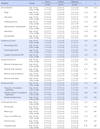Abstract
Purpose
The purpose of this study was to evaluate the effects of the Job Stress Management Program (JSMP) combined with communication skills training for health care professionals.
Methods
The study design was a nonequivalent control group pre-post test design. Study participants were 42 health care professionals in the experimental group and 38 in the control group. Eight sessions of JSMP were provided over 6 weeks, through on-line and off-line education. Data were analyzed using χ2-test, t-test with the SAS 9.2 program.
Figures and Tables
References
1. Baik DW, Yom YH. Effects of social support and emotional intelligence in the relationship between emotional labor and burnout among clinical nurses. J Korean Acad Nurs Adm. 2012; 18:271–280.

2. Baik JC. Possible effect of interpersonal relationship stress on working mindset and turnover intention. Gyeongju: Uiduk University;2008. Unpublished doctoral dissertation.
3. Cho NO, Hong YS, Kim HS. Study of nurse's interpersonal conflict and communication. J Korean Acad Soc Nurs Educ. 2001; 7:369–378.
4. Cooper CL, Marshall J. Sources of managerial and white collar stress in stress at work. J Organ Behav Manage. 1986; 177.
5. Doi Y, Minowa M, Tango T. Impact and correlates of poor sleep quality in Japanese white-collar employees. Sleep. 2003; 26:467–471.

6. Edéll-Gustafsson UM, Kritz EI, Bogren IK. Self-reported sleep quality, strain and health in relation to perceived working conditions in females. Scand J Caring Sci. 2002; 16:179–187.

7. Gaines J, Jermier J. Emotional exhaustion in a high stress organization. Acad manage J. 1983; 26:567–586.

8. Han AK, Kim OS, Won JS. A study on job stress and coping method by the personality types of clinical nurses. Clin Nurs Res. 2007; 13:125–136.
9. Han KS, Lim HS, Park YH, Choi MY, Cha SK, Lee EM. Factors influencing job stress of health care providers. Korean J Stress Res. 2012; 20:209–220.
10. Han KS, Park EY, Park YH, Lim HS, Lee EM, Kim L, et al. Factors influencing sleep quality in clinical nurses. J Korean Acad Psychiatr Ment Health Nurs. 2011; 20:121–131.

11. Han KS, Park YJ, Kim KM, Oh YJ, Jin JH, Kang HC. Communication style, self efficacy, emotional regulation, and ways of coping among nursing students. J Korean Acad Psychiatr Ment Health Nurs. 2008; 17:28–34.
12. Ha NS. The effect of assertiveness training on the stress response and assertive behavior of nurses. Seoul: The Catholic University of Korea;1998. Unpublished doctoral dissertation.
13. Härmä M, Sallinen M, Ranta R, Mutanen P, Müuller K. The effect of an irregular shift system on sleepiness at work in train drivers and railway traffic controllers. J Sleep Res. 2002; 11:141–151.

14. Hochschild AR. The managed heart. San Francisco: University of California Press Berkeley;1983.
15. Jeong KJ. The effectiveness of communication program for employees on interpersonal relationships, interpersonal stress, and work satisfaction. Seoul: Sookmyung Women's University;2010. Unpublished master's thesis.
16. Kim MJ. Effects of the hotel employee's emotional labor upon the job-related attitudes. J Tourism Sci. 1998; 21(2):129–141.
17. Kim YS, Park JH, Lim KY. Interpersonal conflicts and communication among medical residents, nurses and technologists. Korean J Hosp Manage. 2006; 11(2):16–31.
18. Koo OH. Clinical nurse's perception of empowerment structural model in nursing organization. Daejon: Chungnam National University;2000. Unpublished Doctoral dissertation.
19. Korea Occupational Safety and Health Agency. Guideline for measuring job stressors (KOSHA CODE H-42-2006). Seoul: Author;2006.
20. Lee KH. Transactional analysis of verbal communication patterns between nurse and patients with dual diagnosis. J Korean Acad Psychiatr Ment Health Nurs. 2007; 16:205–212.
21. Lee SS. Analysis of communication stance by psychological tendency. Busan: Pusan National University;1998. Unpublished master's thesis.
22. Lee SW. A study on stress responses of Korean-American. J Nurs Acad Soc. 1992; 22:238–247.
23. Morris JA, Feldman DC. The dimension, antecedents and consequences of emotional labor. Acad Manage Rev. 1996; 21:986–1010.
24. Park BG. Moderating effects of organizational support and self efficacy on the relationship between emotional labor and job attitudes. J Hum Resour Manag Res. 2008; 15(1):69–85.
25. Park SH, Yon MH. A study on the effectiveness of communication group counseling program on communication ability, interpersonal relationship, stress & job satisfaction-focused on corporate environment. Korean J Couns. 2009; 10:887–910.
26. Park YH. Effect of the assertive training program on assertive behavior, symptom of stress and interpersonal relationship of intensive care unit nurses. Seoul: Korea University;2007. Unpublished master's thesis.
27. Park YR, Yang S. Nurse manager's facilitative communication and nurses' organizational commitment, job satisfaction, and empowerment. J Korean Acad Psychiatr Ment Health Nurs. 2008; 17:342–352.
28. Rowe MM, Shelrlock H. Stress and verbal abuse in nursing: Do burn out nurses eat their young? J Nurs Manag. 2005; 13:242–248.
29. Shin YO. Communication training program for father with teens. Seoul: Seoul Theological University;2007. Unpublished master's thesis.




 PDF
PDF ePub
ePub Citation
Citation Print
Print






 XML Download
XML Download